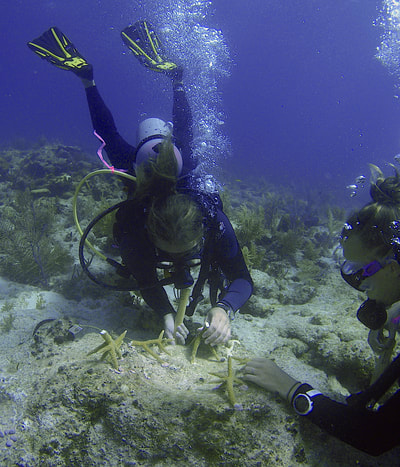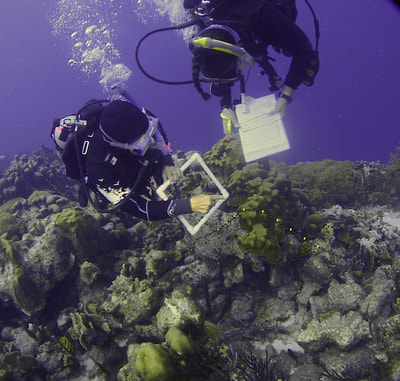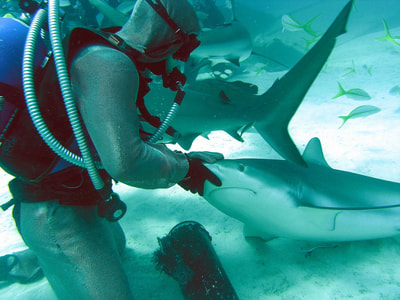Coral Reef Restoration Research Diving Shark Conservation & Ecotourism
OEI programs work both ends of the tourism equation, meaning we offer training for both marine tourists and tourism professionals. Some of our programs can be offered in a format appropriate for both audiences, while others are completely business-oriented with little relevance to those not working in the industry.
In addition, OEI works with clients on an individualized basis developing customized training, or adapting existing programming, based on an analysis of the client’s needs. In most cases programs are presented in modular format involving three to six hours of instruction (lecture, workshops and lively interactive discussions). Consumer programs can be as short as one hour. Some programs also include field work, such as learning coral reef assessment protocols and other in-water activities.
Below is an overview of some of our existing programs, all of which can be customized to individual client need and circumstance. If you would like more information than provided, we’ll be happy to send a more detailed description of any existing program. However, it’s best to call 954-701-1966 to discuss your specific needs and objectives.
Merging Business and the Environment: A Guide to Marketing Sustainability
This six-hour seminar is an introduction to sustainable marine tourism, and the emerging concept of the “triple bottom line.” Discussions include consumer trends, and how the tourism experience can be improved in ways that maximize profitability. A myriad of examples of best practices from around the world are examined. Other topics include:
A Glimmer of Hope: Rebuilding Coral Reefs
In 2010 Dr. Brylske created the first accredited undergraduate course in America on coral reef restoration. The expertise he acquired over the intervening years served as the basis for this three-hour primer on the emerging trend. The program reviews the development of coral restoration technologies, their evolution to the current state-of-the-art and highlights existing programs currently underway throughout the world. Participants will enjoy learning how scientists and recreational divers are collaborating to make the environment “better than they found it.”
Sharks in Depth: In the Jaws of Extinction
This three-hour program begins with a comprehensive review of shark evolution, diversity, and biology. You’ll also learn why sharks are vital components of a healthy marine ecosystem, and what happens when sharks are removed. Explore how humans also benefit from sharks. Review the conservation status of major shark species, and why sharks are especially vulnerable to overfishing. Gain insight into shark behavior so they can be safely observed in the wild. Gain perspective on the true nature and risk of attack (highlighting a new campaign to change the way shark encounters are dealt with in the media). Discover how to avoid aggressive encounters with sharks. And finally, learn how individuals and organizations can, and are, reducing the decline of shark populations. For professional audiences an added component on shark tourism will examine this worldwide phenomenon and offer insight into how this may affect conservation efforts. Best tourism practices and guidelines, along with engaging methods to educate the public, will be discussed in this two-hour add-on session. (To read Dr. Brylske's article, "Shark Diving as a Conservation Strategy: How Shark Tourism is Protecting Global Shark Population" click here.)
Exploring the Shore: Understanding Seagrass & Mangrove Communities
While most marine tourists love coral reefs, the equally vital seagrass and mangrove communities often go completely ignored. However, by understanding their function and importance, the tourism experience can be enhanced and create new opportunities for tour operators. This two-hour program examines the ecological roll of seagrass beds and mangrove forests, highlights the primary community members and explains why these near-shore communities are so vital to the health of coral reefs.
Beyond Wreck Diving: Submerged Cultural Resources and Maritime Archaeology
To many, the cultural aspects of diving are as interesting, if not more, than the living resources. This is why wreck diving is so popular. Likewise, cultural tourism is a big part of the booming ecotourism phenomenon. And just like coral reefs or sharks, the more you know about artifacts, including shipwrecks, the more you can appreciate the underwater experience. But this three-hour seminar explores much more than shipwrecks. The program begins by explaining the term “submerged cultural resources,” and what issues within the field affect recreational divers. We’ll then turn attention to shipwrecks and take a comprehensive look at why these are important from both cultural and biological perspectives. Also addressed are topics such as survey methodology, artifact preservation and laws regulating shipwreck exploration and exploitation. The program will conclude with a discussion of the conflicts that sometimes occur between divers and resource managers, wreck diving etiquette and how the diving community contributes to insuring shipwrecks will endure long into the future. We promise this program will change your whole perspective on wreck diving.
Artificial Reefs: Build Them and They Will Come
Artificial reefs have been an important marine resource management tool for several decades. But only in the past few years have they been used as an effective strategy in promoting dive tourism. Furthermore, while divers universally support expansion of artificial reef projects, not everyone in the marine resource management community is so supportive. This three-hour seminar will trace the history of artificial reef technology—from “materials of opportunity” to decommissioned ships—and address pertinent issues related to dive tourism. We’ll delve into the “attraction versus production” debate, the role artificial reefs in reducing diving pressure on natural reefs and how artificial reefs may affect fisheries, both positively and negatively. The sinking of the Hoyt S. Vandenburg off Key West in 2009 will serve as a case study.
Coral Grief: Death by a Thousand Cuts
This presentation examines the threats to coral reefs from a local, regional and global perspective; and also offers hope for how the trajectory of decline might be reversed. The program will be customized so it is location-specific.
Research Diving in Coral Reef Environments
The goal of this course is to create recreation divers who are effective “citizen scientists” capable of assisting research efforts involving coral reef ecosystems with emphasis on health monitoring. The content will include:
Beyond environmental issues, another topic that interests divers and dive professionals is the science of scuba. As an recognized expert in the field of diver education, and former consultant to the Divers Alert Network, Dr. Brylske has developed two programs exploring cutting-edge issues involving diving physiology and safety.
Diving Safety Myths & Misconceptions
This three-hour program takes an in-depth look—and explodes—the following ten myths about diving physiology and safety: 1) all decompression models are based on the same concepts and assumptions; 2) you can’t get the bends if you follow tables or computers as directed; 3) bends is an all or none event…you either have it or you don’t; 4) the type of bends recreational divers get isn’t as serious as in commercial or military divers; 5) bends is just a ‘bubble disorder’ so if you get rid of the bubbles, you get rid of the problem; 6) if I get the bends I should immediately get to the nearest recompression chamber; 7) deep safety stops (below 20 feet) are dangerous; 8) fewer cases of bends have been reported since dive computers became popular; 9) more cases of bends have been reported since dive computers became popular; and 10) diving is more dangerous than ever. The seminar content is based on the latest research findings.
Dive Safety: New Insights and Fresh Perspectives
This three-hour presentation examines some of the more “cutting edge”—and interesting—areas of diving physiology, how they impact safety and how they may change diving practice. Topics include: fatal accident analysis; analysis of out-of-air emergencies; how diving affects breathing efficiency; why fitness is important in scuba diving; how aging may affect divers; divers and heart disease; the gender question. Like the previous program, the seminar content is based on the latest research findings.
If you didn’t see a program that meets your needs, don’t despair. Our 40-plus years in marine science and tourism means that there are few issues we can’t help you with. To find out how, give us a call.
NOTE: OEI programs are not allied with any specific diver training organization. We are strictly “agency neutral,” and work with any organization who wants to help us promote our vision—to make marine tourism an important and positive force in ocean conservation.
OEI programs work both ends of the tourism equation, meaning we offer training for both marine tourists and tourism professionals. Some of our programs can be offered in a format appropriate for both audiences, while others are completely business-oriented with little relevance to those not working in the industry.
In addition, OEI works with clients on an individualized basis developing customized training, or adapting existing programming, based on an analysis of the client’s needs. In most cases programs are presented in modular format involving three to six hours of instruction (lecture, workshops and lively interactive discussions). Consumer programs can be as short as one hour. Some programs also include field work, such as learning coral reef assessment protocols and other in-water activities.
Below is an overview of some of our existing programs, all of which can be customized to individual client need and circumstance. If you would like more information than provided, we’ll be happy to send a more detailed description of any existing program. However, it’s best to call 954-701-1966 to discuss your specific needs and objectives.
Merging Business and the Environment: A Guide to Marketing Sustainability
This six-hour seminar is an introduction to sustainable marine tourism, and the emerging concept of the “triple bottom line.” Discussions include consumer trends, and how the tourism experience can be improved in ways that maximize profitability. A myriad of examples of best practices from around the world are examined. Other topics include:
- Shifting Demographics: The “Environmental” Consumer
- Selling the Environment: Turning Green Into Green
- From Low-Impact to Positive-Impact: Managing and Supervising Divers
- Why Environmental Education Fails: Designing Programs That Work
A Glimmer of Hope: Rebuilding Coral Reefs
In 2010 Dr. Brylske created the first accredited undergraduate course in America on coral reef restoration. The expertise he acquired over the intervening years served as the basis for this three-hour primer on the emerging trend. The program reviews the development of coral restoration technologies, their evolution to the current state-of-the-art and highlights existing programs currently underway throughout the world. Participants will enjoy learning how scientists and recreational divers are collaborating to make the environment “better than they found it.”
Sharks in Depth: In the Jaws of Extinction
This three-hour program begins with a comprehensive review of shark evolution, diversity, and biology. You’ll also learn why sharks are vital components of a healthy marine ecosystem, and what happens when sharks are removed. Explore how humans also benefit from sharks. Review the conservation status of major shark species, and why sharks are especially vulnerable to overfishing. Gain insight into shark behavior so they can be safely observed in the wild. Gain perspective on the true nature and risk of attack (highlighting a new campaign to change the way shark encounters are dealt with in the media). Discover how to avoid aggressive encounters with sharks. And finally, learn how individuals and organizations can, and are, reducing the decline of shark populations. For professional audiences an added component on shark tourism will examine this worldwide phenomenon and offer insight into how this may affect conservation efforts. Best tourism practices and guidelines, along with engaging methods to educate the public, will be discussed in this two-hour add-on session. (To read Dr. Brylske's article, "Shark Diving as a Conservation Strategy: How Shark Tourism is Protecting Global Shark Population" click here.)
Exploring the Shore: Understanding Seagrass & Mangrove Communities
While most marine tourists love coral reefs, the equally vital seagrass and mangrove communities often go completely ignored. However, by understanding their function and importance, the tourism experience can be enhanced and create new opportunities for tour operators. This two-hour program examines the ecological roll of seagrass beds and mangrove forests, highlights the primary community members and explains why these near-shore communities are so vital to the health of coral reefs.
Beyond Wreck Diving: Submerged Cultural Resources and Maritime Archaeology
To many, the cultural aspects of diving are as interesting, if not more, than the living resources. This is why wreck diving is so popular. Likewise, cultural tourism is a big part of the booming ecotourism phenomenon. And just like coral reefs or sharks, the more you know about artifacts, including shipwrecks, the more you can appreciate the underwater experience. But this three-hour seminar explores much more than shipwrecks. The program begins by explaining the term “submerged cultural resources,” and what issues within the field affect recreational divers. We’ll then turn attention to shipwrecks and take a comprehensive look at why these are important from both cultural and biological perspectives. Also addressed are topics such as survey methodology, artifact preservation and laws regulating shipwreck exploration and exploitation. The program will conclude with a discussion of the conflicts that sometimes occur between divers and resource managers, wreck diving etiquette and how the diving community contributes to insuring shipwrecks will endure long into the future. We promise this program will change your whole perspective on wreck diving.
Artificial Reefs: Build Them and They Will Come
Artificial reefs have been an important marine resource management tool for several decades. But only in the past few years have they been used as an effective strategy in promoting dive tourism. Furthermore, while divers universally support expansion of artificial reef projects, not everyone in the marine resource management community is so supportive. This three-hour seminar will trace the history of artificial reef technology—from “materials of opportunity” to decommissioned ships—and address pertinent issues related to dive tourism. We’ll delve into the “attraction versus production” debate, the role artificial reefs in reducing diving pressure on natural reefs and how artificial reefs may affect fisheries, both positively and negatively. The sinking of the Hoyt S. Vandenburg off Key West in 2009 will serve as a case study.
Coral Grief: Death by a Thousand Cuts
This presentation examines the threats to coral reefs from a local, regional and global perspective; and also offers hope for how the trajectory of decline might be reversed. The program will be customized so it is location-specific.
Research Diving in Coral Reef Environments
The goal of this course is to create recreation divers who are effective “citizen scientists” capable of assisting research efforts involving coral reef ecosystems with emphasis on health monitoring. The content will include:
- How research diving differs from recreational diving, why how these differences are accommodated in the training process.
- Common methods for environmental monitoring of coral reefs using quadrats and various transect methods including point-intercept, belt and chain.
- The biology of corals and the functional ecology of coral reef ecosystems.
- The status of coral reefs and major causes for decline.
- Open water training includes six to eight dives involving surveys of local coral reefs examining the following parameters:
- Substrate composition
- Rugosity measurement
- Coral health indicators (bleaching, disease, predation, damage)
- Invertebrate and fish inventories (with emphasis on impact assessment).
Beyond environmental issues, another topic that interests divers and dive professionals is the science of scuba. As an recognized expert in the field of diver education, and former consultant to the Divers Alert Network, Dr. Brylske has developed two programs exploring cutting-edge issues involving diving physiology and safety.
Diving Safety Myths & Misconceptions
This three-hour program takes an in-depth look—and explodes—the following ten myths about diving physiology and safety: 1) all decompression models are based on the same concepts and assumptions; 2) you can’t get the bends if you follow tables or computers as directed; 3) bends is an all or none event…you either have it or you don’t; 4) the type of bends recreational divers get isn’t as serious as in commercial or military divers; 5) bends is just a ‘bubble disorder’ so if you get rid of the bubbles, you get rid of the problem; 6) if I get the bends I should immediately get to the nearest recompression chamber; 7) deep safety stops (below 20 feet) are dangerous; 8) fewer cases of bends have been reported since dive computers became popular; 9) more cases of bends have been reported since dive computers became popular; and 10) diving is more dangerous than ever. The seminar content is based on the latest research findings.
Dive Safety: New Insights and Fresh Perspectives
This three-hour presentation examines some of the more “cutting edge”—and interesting—areas of diving physiology, how they impact safety and how they may change diving practice. Topics include: fatal accident analysis; analysis of out-of-air emergencies; how diving affects breathing efficiency; why fitness is important in scuba diving; how aging may affect divers; divers and heart disease; the gender question. Like the previous program, the seminar content is based on the latest research findings.
If you didn’t see a program that meets your needs, don’t despair. Our 40-plus years in marine science and tourism means that there are few issues we can’t help you with. To find out how, give us a call.
NOTE: OEI programs are not allied with any specific diver training organization. We are strictly “agency neutral,” and work with any organization who wants to help us promote our vision—to make marine tourism an important and positive force in ocean conservation.



